Former NFL football player Ricky Williams and partner Jim McAlpine are planning to open the world’s first cannabis-gym in San Francisco later this year. The goal of “Power Plant Fitness” will be “to incorporate full mind training along with body training.” Customers will be encouraged to bring their own marijuana products or buy the pre- and post-workout, drug-infused edibles that the company will sell on site.
In terms of core business competencies, each partner can be considered an expert in both workouts and weed. After 20+ years in the ski and snowboard industry, McAlpine founded the 420 Games, “a series of athletic events advocating responsible use of cannabis,” designed to “destigmatize the many people who use it in a positive manner.”
The 420 Games take place in a handful of western cities (San Francisco, Portland, Seattle, Denver, and Boulder) and involve one main athletic event: a 4.2 mile “fun run,” the idea of which is to take the typical 5K (3.1 mile) jaunt and go an extra mile “for cannabis respect.” A 420 event also normally includes "beer tasting, great music and educational speeches.”
Ricky Williams is perhaps an even greater leader when it combining sports and stash. Not only did he win the Heisman Trophy while a Texas Longhorn running back in 1998, his 2,124 rushing yards that season set a new collegiate record. Williams kept on running into the NFL, where he amassed 10,009 yards and 66 rushing touchdowns, setting Dolphins franchise records for single-season yards and touchdowns.
Williams’ professional career was also distinguished by run-ins with NFL rules. He “violated the league's drug policy a total of four times—three times for marijuana and once for another substance.” Williams claimed that cannabis was a preferred approach for reducing pain and taking care of his body, an argument he now maintains under the mission of Power Plant Fitness.
Perhaps Williams has a point. Most of us can’t imagine the beating the body of an NFL running back takes. Maybe marijuana is a way to escape some of the post-impact pain. Also, the legal acceptance of cannabis continues to grow. Twenty U.S. states have now legalized marijuana for medical purposes, and four states (Alaska, Colorado, Oregon, and Washington) permit its recreational use. What’s more, one-in-three Americas have supposedly tried the drug.
I’ve never used drugs, played in the NFL, or suffered severe physical trauma that might merit some extreme medical treatment, so it’s hard for me to refute Williams’ point, other than to suggest that thousands of other elite athletes somehow manage without weed. A more direct debate is whether a fitness center should encourage ordinary athletes to use marijuana as part of their routine exercise regimen.
In tackling this question, it’s important to consider the effects of cannabis. Whether it’s smoked in a reefer, drunk as tea, or baked into brownies, THC, active ingredient in the hemp plant “makes you feel high.” That euphoria is, of course, the sensation that most pot users are pursuing, but they may not recognize the other effects that cannabis has on one’s body, like the ones that WebMD identifies:
- “It affects almost every organ in your body, and your nervous system and immune system, too.”
- “Smoking pot can increase your heart rate by as much as two times for up to 3 hours. That’s why some people have a heart attack right after they use marijuana.”
- “It can increase bleeding, lower blood pressure, and affect your blood sugar, too."
- Because smoking irritates your lungs “regular pot smokers are more likely to have an ongoing cough and to have lung-related health problems like chest colds and lung infections.”
While each of these potential outcomes is concerning, some other related side-effects make the combination of pot and exercise seem seriously irresponsible: Marijuana often causes dizziness, shallow breathing, and slowed reaction time. These are certainly not the kinds of symptoms one wants to experience while lifting weights, striding on an elliptical machine, or doing most other kinds of exercise.
Another very important consideration is that Power Plant Fitness is a public gym, not one’s residence, which means customers need to travel to and from the facility. It’s reasonable to expect that some people will make that commute in a drug-impaired state, which could be extremely risky, especially if those customers are driving.
Drugs.com warns, “Do not drive, operate machinery, or perform other hazardous activities while using cannabis. It may cause dizziness, drowsiness, and impaired judgment . . . making activities such as driving a car or operating machinery difficult and dangerous.” WebMD adds, “If you drive after using marijuana, your risk of being in a car accident more than doubles.”
People tend to use marijuana because of the ecstasy they experience, but there also can be a variety of negative psychological consequences including anxiety, depression, paranoia, random thinking, and short-term forgetfulness.
Perhaps the biggest risks of cannabis use, however, are addiction and potential transition to more serious drugs. “Nearly 10% of people who use [marijuana] become dependent on it.” In addition, although the evidence is still unclear, it’s possible that cannabis use could inspire one to experiment with harder drugs like heroin and cocaine.
A big variable impacting Power Plant Fitness’s potential success is the legalization of marijuana for recreational purposes, which should appear on the ballot in California this November. If the referendum passes and Californians gain wide-ranging use of cannabis, it’s likely the gym will experience a flood of business—my speculation based on the apparent success of the 420 Games and America’s increasing acceptance of pot.
Still, the picture of people combining exercise and ecstasy is not a pretty one for society. Besides the many negative physical and psychological outcomes outlined above, there also seems to be real potential for other drug use to increase and for people to try to integrate those addictions into other areas of their lives, like work and home. For these reasons, encouraging weed-aided workouts represents the bad state of “Single-Minded Marketing.”
Learn more about the Mindful Matrix and Mindful Meter.
Check out Mindful Marketing Ads and Vote your Mind!

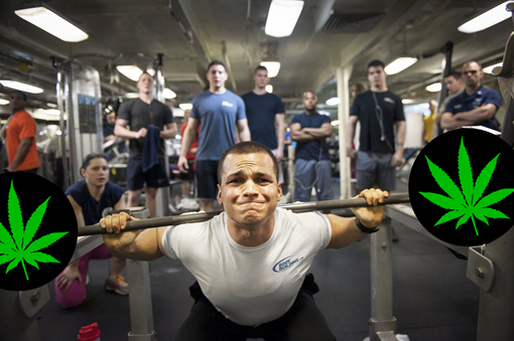
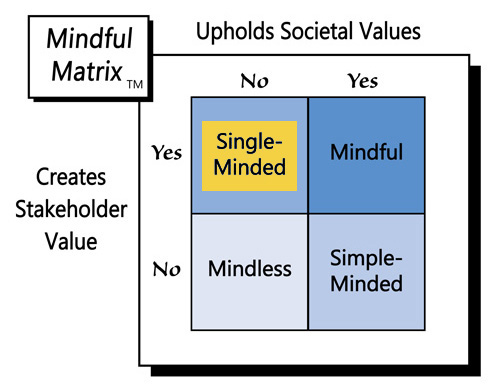
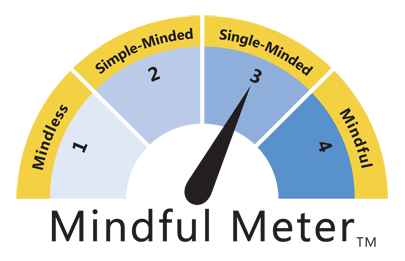

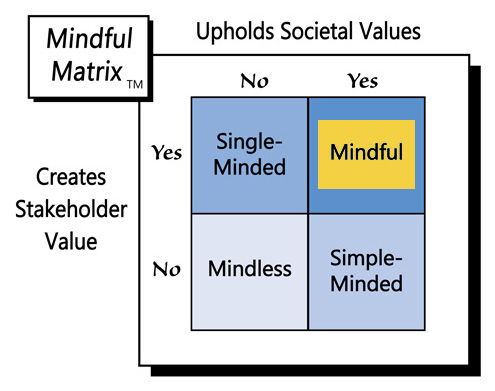
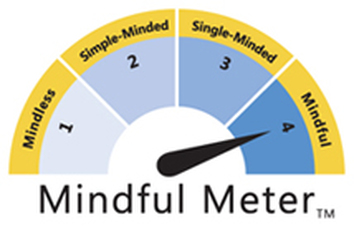

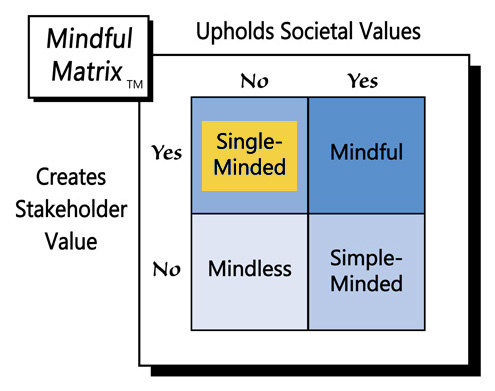
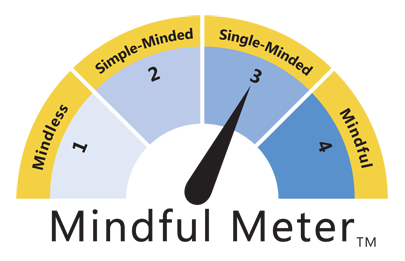

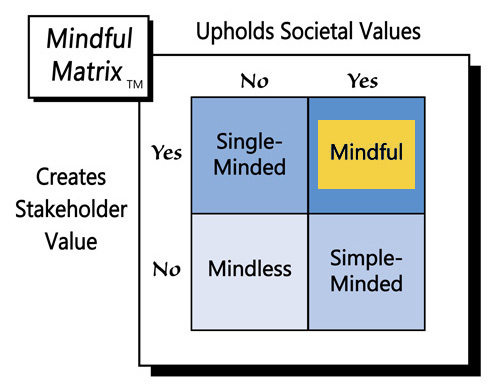
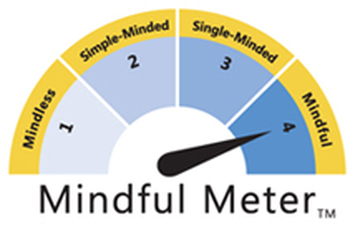
 RSS Feed
RSS Feed